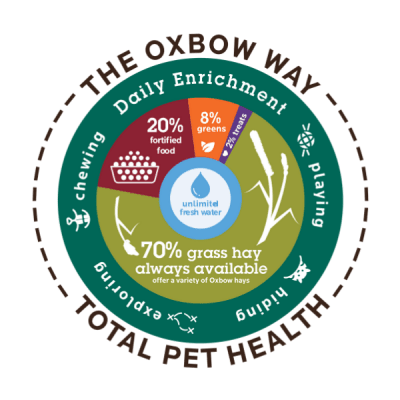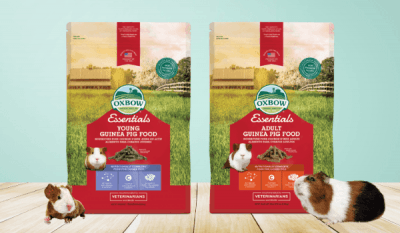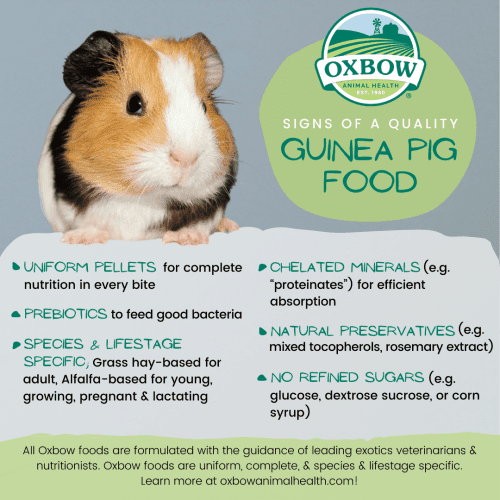Choosing a quality food for your guinea pig is one of the most important nutritional decisions you will make as a pet parent. A species-appropriate fortified food is an essential part of your guinea pig’s daily diet. If you’ve ever found yourself overwhelmed by the number of food options for your guinea pig, you’re not alone. With so many options available in the food aisle, choosing one that’s best for your piggie can be a confusing and even stressful process for new pet parents and longtime pet caretakers alike. In this article, we’ll walk through all the basic information necessary to help you choose a food that meets the specific nutritional needs of your beloved guinea pig.
This article will cover the following important topics:
- Why do guinea pigs need fortified food?
- How much food should my guinea pig eat each day?
- Which type of food is best for guinea pigs?
- Uniform food vs. Mixes: which is better for guinea pigs?
- Young vs. Adult: the importance of choosing a life stage-specific food
- A closer look at key ingredients
- Quality guinea pig food checklist
Why Do Guinea Pigs Need Fortified Food?
Fortified foods are an essential part of the daily diet of guinea pigs, providing key vitamins and minerals small pets such as guinea pigs need to thrive. In the wild, your pet would consume fresh plant material each day, receiving ample amounts of micronutrients (i.e. vitamins and minerals) in the process. In captivity, it becomes your responsibility as pet parent to provide these important components of nutrition.
How Much Food Should My Guinea Pig Eat Each Day?
Daily food requirements will vary depending on age, species, and possible additional factors specific to your individual pet(s). Young, growing, and pregnant/nursing pets have higher nutritional requirements and will generally require a larger quantity of food (or more free access to food) than mature pets. Always follow the feeding guidelines on your pet’s specific food package. Consult your veterinarian if you have specific questions about how much food your animal should eat.

A balanced, uniform fortified food should make up approximately 20% of your guinea pig’s daily diet. The majority of the daily diet (70%) should come from unlimited amounts of fresh grass hay. The remainder of the diet should be rounded out with fresh greens (8%) and healthy, all-natural treats (up to 2%).
Which Type of Food is Best for My Guinea Pig?
One of the biggest differences you will notice when comparing options in the food aisle is the visual contrast between uniform and mix-based foods. What are the primary differences between these food types, and which is the best choice for your pet? Let’s take a closer look.
Mix-Based Diets
Mixes typically include multiple shapes, colors, and types of food pieces. Many of these diets contain seeds, nuts, yogurt drops, and miscellaneous other pieces. It is not uncommon for these diets to include added sugars and artificial colors and flavors. As “concentrate selectors,” guinea pigs are wired to choose to most calorically-dense pieces first, leaving the beneficial pellets behind.
- Contain a variety of seeds, nuts, fruits & miscellaneous pieces which are often high in carbohydrates and simple sugars
- Typically lower in fiber than uniform pellets
- Come in various bright colors to appear “fun” and appeal to young customers
- Can lead to obesity, selective eating, and GI illness
Uniform Pellets
As the name implies, these pellets are “uniform” in appearance. While uniform pellets may be less likely to catch your eye on the shelf, feeding them is the best way to guarantee that your pet receives complete nutrition in every serving. Uniform pellets are less likely to contain the added sugars and artificial colors and flavors that are common in mix-based diets. However, it’s important to examine the nutrient panel closely to ensure that the ingredients are high quality in nature and appropriate for your pet’s species and life stage.
- Prevent selective eating common amongst small pets
- Provide complete nutrition in every bite
- Typically higher in fiber than mixes
- Less “fun” visually
- Less likely to contain added sugars, artificial colors, or flavors
Guinea Pigs as Concentrate Selectors
When it comes to eating habits, guinea pigs and other small animals are classified as “concentrate selectors.” As prey species in the wild, these animals are wired to select and eat the most energy-dense plant material available, as quickly as possible. For domesticated pets, these instincts are no longer tied to survival, but they are still likely to lead to selective eating. Choosing a uniform food helps prevent this potentially unhealthy behavior.
Young vs. Adult – The Importance of Choosing a Lifestage Specific Food
Like other species, guinea pigs have specific nutritional needs at various stages in life. For example, young, growing, and pregnant/lactating guinea pigs have higher energy requirements and should be offered a food that is specifically designed to meets these needs. An alfalfa-based uniform pellet provides higher protein and calcium necessary to support guinea pigs during these stages of life. For adult guinea pigs, a grass hay-based food that provides appropriate levels of protein and fat to meet maintenance needs while preventing obesity.

Taking a Closer Look at the Label
Refined vs. Unrefined Sugars
Not all sugars are created equal. Unlike unrefined sugars (which are absorbed slowly over time), refined sugars are rapidly absorbed and can lead to obesity and other health issues. Avoid foods that contain refined sugars such as glucose, dextrose, or corn syrup. Some Oxbow foods contain a small amount of unrefined sugar (e.g. cane molasses) to assist with pellet integrity. Cane molasses is an unrefined sugar that is absorbed slowly over time.
Chelated Minerals – A More Absorbable Source
In the wild, guinea pigs and other herbivore species receive all the minerals they need from the fresh plant material they consume. As pets, it’s important that your guinea pig has access to high quality minerals via their daily food. Some minerals can be more difficult than others for small pets to absorb. Through the process of “chelation,” minerals are bound to amino acids to form an easily absorbable mineral complex. Chelated minerals are designed to survive digestion and are more readily absorbed than their non-chelated counterparts.
Label Watcher Tip:Chelated minerals can typically be identified by the suffix following a mineral’s chemical name (e.g. copper chelate, zinc proteinate, etc).
Prebiotics
Prebiotics are non-digestible ingredients that provide food for the good bacteria in your pet’s GI tract. Fermentation of prebiotics within the GI tract produces beneficial fatty acids which aid in the digestion process. Examples of beneficial prebiotics to look for in a high-quality food include inulin (chicory root), yeast culture, and hydrolyzed yeast.
Probiotics
Probiotics are live bacteria intended to maintain healthy levels of good bacteria in the GI tract. While probiotic supplements are popular in humans and certain pet species, these bacteria have not been proven to survive the manufacturing process in conventional foods, nor the acidic environment of the stomach. Furthermore, additional research is necessary to understand which specific strains of good bacteria exist in the GI tract of different small animals. Avoid foods making health claims relating to probiotics.
Quality Guinea Pig Food Checklist

Use the following checklist to help you make the all-important decision of choosing a food for your guinea pig. If the food you select checks all of the below boxes, you can feel confident you’re selecting a food that will support the health and wellbeing of your pet:
- Uniform pellets = complete nutrition in every serving
- Species & Lifestage Specific (Timothy hay-based for adult, Alfalfa-based for young, growing, pregnant & lactating)
- Chelated minerals (e.g. “proteinates”) for most efficient absorption
- Prebiotics to feed good bacteria
- Natural Preservatives (Mixed Tocopherols, Rosemary Extract)
- No refined sugars (e.g. glucose, dextrose sucrose, corn syrup)
All Oxbow foods are formulated with the guidance of leading exotics veterinarians and nutritionists. Oxbow foods are uniform, complete, and species & lifestage specific to meet the specific needs of pets.
Learn More
How Much Hay Should My Rabbit or Guinea Pig Eat Every Day?
